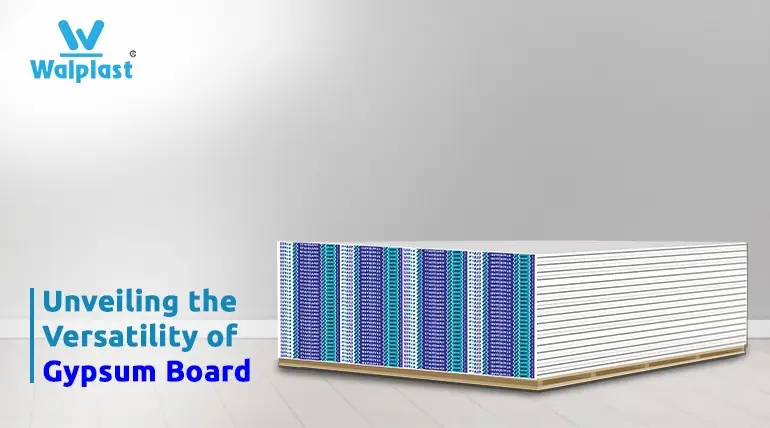
Gypsum board, commonly known as drywall or plasterboard, stands as a cornerstone in the construction industry, celebrated for its versatility, durability and ease of installation. From residential homes to commercial buildings, this humble building material plays an indispensable role in modern construction practices. In this blog, we delve into the myriad aspects of the gypsum board, exploring its composition, applications, benefits, and more.
Composition and Manufacturing of Gypsum Board:
Gypsum board primarily comprises gypsum, a naturally occurring mineral composed of calcium sulfate dihydrate. The manufacturing process involves crushing and grinding gypsum into a fine powder, which is then mixed with water to form a slurry. This slurry is poured onto a layer of paper, sandwiched between two sheets of heavy paper or fibreglass mats. The mixture is subsequently dried and cut into large sheets, ready for installation.
Applications of Gypsum Board:
Interior Walls and Ceilings:
Gypsum board is widely utilized for interior wall and ceiling applications due to its smooth surface finish and exceptional fire resistance properties. It provides a robust base for paint, wallpaper or decorative finishes, making it an ideal choice for both residential and commercial spaces.
Partition Walls:
Gypsum board partitions offer a cost-effective and flexible solution for dividing interior spaces in offices, hospitals, schools, and other commercial buildings. These lightweight partitions can be easily installed, modified, or removed to accommodate changing spatial needs.
Soundproofing:
When combined with sound-insulating materials, gypsum board helps dampen noise transmission between rooms, making it an excellent option for soundproofing walls and ceilings in theatres, recording studios, and residential units.
Fire Protection:
One of the gypsum board’s most significant advantages is its fire resistance. Gypsum contains water molecules that are released when exposed to fire, effectively retarding the spread of flames and providing valuable time for evacuation and firefighting efforts.
Benefits of Gypsum Board:
Quick Installation:
Gypsum board installation is faster and less labour-intensive compared to traditional plastering methods, thereby reducing construction time and costs.
Smooth Finish:
Gypsum board offers a smooth and uniform surface that is ready for painting or other decorative treatments without requiring extensive preparation.
Durability:
Despite its lightweight nature, the gypsum board is highly durable and resistant to impact, moisture, and mould growth, ensuring long-term performance and structural integrity.
Sustainability:
Gypsum board is a sustainable building material that can be recycled and reused, thereby minimizing waste and environmental impact during construction and demolition.
In conclusion, gypsum board emerges as a versatile and indispensable building material, offering a plethora of applications and benefits in the construction industry. For the highest quality and trustworthy products, we recommend utilizing Walplast Gypsum products, known for their durability and eco-friendliness. Whether employed for interior walls, partitions, soundproofing, or fire protection, gypsum board continues to reign as a preferred choice for architects, contractors, and homeowners alike, owing to its ease of installation, durability, and sustainability.
